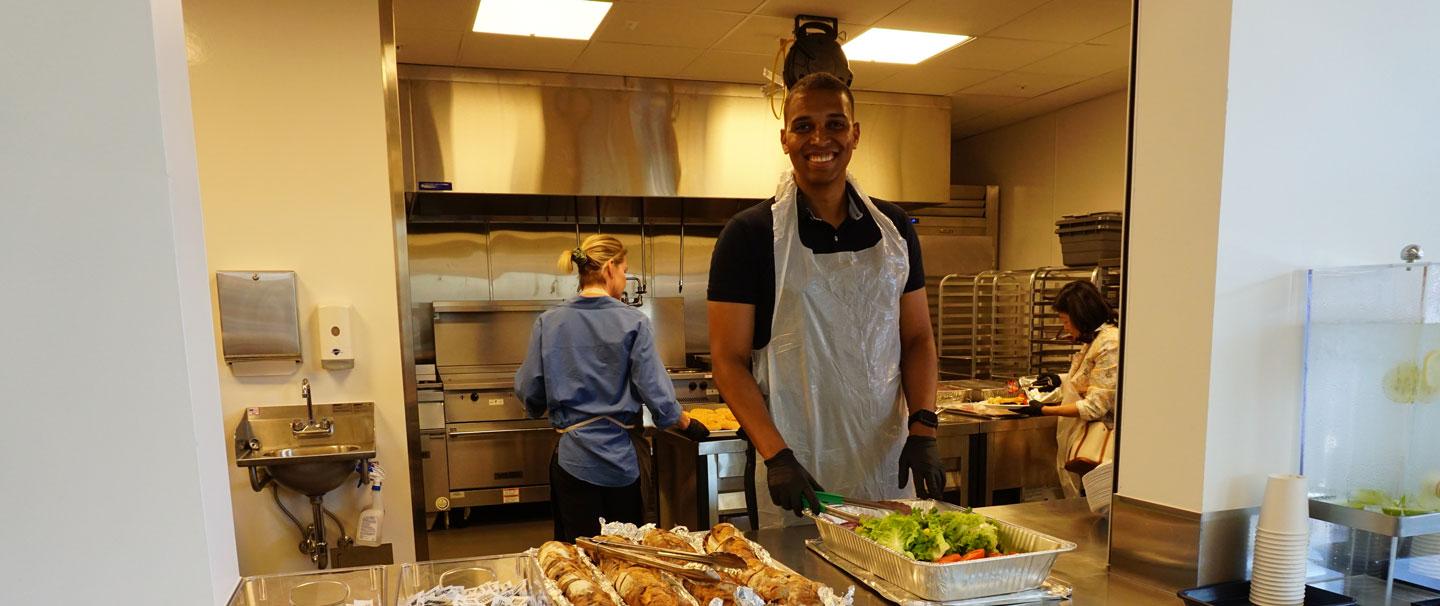When it comes to feeding our clients at LifeMoves, the mission is simple yet profound: feed people three meals a day, just like you would your own family. Achieving this commitment requires the collective creativity and dedication of the LifeMoves Food Services team in close coordination with community and corporate partners.
Every day of the year, a mighty team of nine LifeMovers, led by Melanie Tate, works to plan, sustainably source, and secure donations and then turn them into nutritional and enjoyable meals for clients. While doing so, they take every opportunity to introduce clients to habits, skills, and strategies that support healthy living. In addition, they have a secondary goal of minimizing food waste, rescuing edible food that might otherwise be thrown out due to cosmetic reasons, and conserving and composting in all LifeMoves kitchens.
Within the LifeMoves organization, there are three commercial kitchens where food is stored and meals are mass-produced. Each of these sites is staffed with a lead cook, food service coordinator, and drivers who rescue food donations and transport meals and pantry items to other LifeMoves sites. Melanie and her team work to create a weekly menu focusing on whole grains and lean proteins. Support from partners is key. Loaves and Fishes provides dinner Monday through Friday. Second Harvest provides pantry items used for breakfast and lunches and to stock communal kitchens at LifeMoves family sites. Both partners share LifeMoves commitment to minimizing food waste. Corporate and private donors provide and serve meals on the weekends and holidays.
Each day, the LifeMoves team prepares breakfast that clients can eat before heading to work and “grab and go” lunches carry with them.
“Breakfast is the most important meal of the day,” says Tate. “For lunch, clients can select a salad, wrap, and a protein. The key is a variety of fresh and healthy options. People feed their feelings. So, structure, like the timing of meals and portion size, matter. We teach our clients that it takes 20 minutes before their brains realize their bellies are full.”
Staff, and in some cases clients, help to serve each meal throughout the week. Volunteers on weekends and holidays are especially important in providing extra support serving, while adding joy and excitement to the client experience. According to Tate, clients at the Navigation Center can gain on the job experience and extra support seeking employment by taking on food services responsibilities. ServSafe certification is also available, a key requirement for many food services and hospitality roles.
When a client first comes to LifeMoves, a case manager works to understand the current diet patterns of the individual and family, noting specific needs, restrictions, and cultural preferences. More than half of clients have high blood pressure, and one in three report a family member with heart disease or diabetes. Providing balanced meals and wellness training are key components to helping clients achieve self-sufficiency. Clients learn about support programs like local food pantries and food assistance programs like WIC and SNAP (formerly food stamps).
“Food is so expensive, and as a population, we don’t use SNAP as we should. There is so much stigma around this program, but at the end of the day, everyone should be able to feed themselves,” says Tate.
As donors consider potential ways in which to support, Tate encourages everyone to focus on overall health and well-being. “Feed our clients like you would feed your family,” says Tate. “Sometimes this means fresh fruits and vegetables; other times it may mean a monetary donation to purchase specialty items that are vegan, vegetarian or culturally diverse.”
Stay Connected!
Receive stories of hope and transformation from LifeMoves.
By joining our list, you agree to receive informative emails and mailings about LifeMoves.



